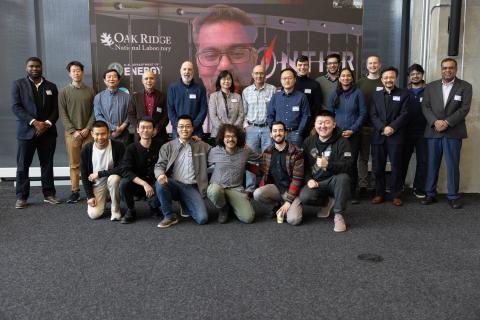event
Georgia Tech Workshop on Foundation of Scientific AI for Optimization of Complex Systems
Primary tabs
January 16th, 2024, at Georgia Tech, Coda Building 9th floor Atrium.
The workshop is jointly sponsored by Georgia Tech's Institute for Data Engineering and Science and School of Computational Science and Engineering.
Website: https://rpestourie.github.io/scientific-ai-gt2024/
Brief Description This one-day workshop will be held at Georgia Tech on January 16th, 2024 and convene experts in computational mathematics, statistics, data science, and application domain scientists across science and engineering to address the foundational topics of scientific AI for the prediction and optimization of complex systems. The agenda emphasizes transcending conventional forward simulations and predictions to realize the optimization of complex systems at a large scale by harnessing the power of scientific AI.
Schedule
Breakfast 8:15 AM - 8:45 AM: Srinivas Aluru & Haesun Park
Opening remarks 8:45 AM - 9:00 AM: Srinivas Aluru & Haesun Park
Session 1
- 9:00 AM - 9:35 AM: Prasanna Balaprakash, ORNL (30 mins + 5 mins Q&A)
Scalable, Automated Deep Neural Network Development for Complex Systems - 9:35 AM - 9:50 AM: Raphaël Pestourie, GT CSE (10 mins + 5 mins Q&A)
Scientific Machine Learning Enables Design via Surrogate Models and End-to-End Training - 9:50 AM - 10:05 AM: Haomin Zhou, GT Math (10 mins + 5 mins Q&A)
Parameterized Wasserstein Geometric Flow
Morning Break 10:05 AM - 10:25 AM (20 mins)
Session 2
- 10:25 AM - 11:00 AM: Bart van Bloemen Waander, Sandia (30 mins + 5 mins Q&A)
Hyper-differential Sensitivity Analysis with Respect to Model Discrepancy - 11:00 AM - 11:15 AM: Amir Poursaee, Clemson (20 mins + 5 mins Q&A)
Corrosion and AI - 11:25 AM - 11:40 PM: Lars Ruthotto, Emory Math (10 mins + 5 mins Q&A)
Generative Modeling for Simulation-Based Inference
Panel Discussion
- 11:40 AM - 12:30 PM: Panel Discussion (50 mins)
Panelists: Prasanna Balaprakash, Bart van Bloemen Waander, Amir Poursaee, Lars Ruthotto
Moderator: Raphael Pestourie
Lunch Break and Networking 12:30 PM - 1:30 PM (60 mins)
Session 3
- 1:30 PM - 2:05 PM: Panos Stinis, PNNL (30 mins + 5 mins Q&A)
Multifidelity Scientific Machine Learning - 2:05 PM - 2:20 PM: Bo Zhu, GT IC (10 mins + 5 mins Q&A)
Computational Fluid Dynamics on Neural Flow Maps - 2:20 PM - 2:35 PM: Bolei Deng, GT AE (10 mins + 5 mins Q&A)
Inverse Design and Optimization of Mechanical Metamaterials - 2:35 PM - 2:50 PM: Yan Wang, GT MechE (10 mins + 5 mins Q&A)
Physics-Informed Machine Learning: (Over-)Promising?
Afternoon Break 2:50 PM -3:10 PM (20 mins)
Session 4
- 3:10 PM - 3:45 PM: Guannan Zhang, ORNL (30 mins + 5 mins Q&A)
Generative Machine Learning Models for Uncertainty Quantification - 3:45 PM - 4:10 PM: Aditi Krishnapriyan, UC Berkeley (20 mins + 5 mins Q&A)
Exploring the Role of Physics-Constrained Machine Learning with Soft and Hard Constraints - 4:10 PM - 4:25 PM: Peng Chen, GT CSE (10 mins + 5 mins Q&A)
Derivative-Informed Neural Operators for PDE-Constrained Optimization under Uncertainty
Panel Discussion and closing
- 4:25 PM - 5:30 PM: Panel Discussion (65 mins)
Panelists: Panos Stinis, Bo Zhu,Guannan Zhang,Aditi Krishnapriyan
Moderator: Peng Chen
Workshop Details
Complex systems are prevalent in a wide range of scientific and engineering disciplines. These systems incorporate numerous variables, some of which are controllable, some are subject to design specifications, and others may be latent or determined by either identified or unidentified processes. Accurate prediction of the system response is intrinsically difficult, yet often secondary to more pressing engineering concerns regarding optimal design or control of the system. For instance, in the realm of electromagnetic (EM) devices, advancements in fabrication technologies have afforded extensive design and control freedoms, such as metamaterials and 4D materials. These developments have rendered simulation and optimization as the limiting factors for inverse design or control applications. In the context of corrosion science, the corrosion initiation of metals is governed by dynamic and complex processes that take place at multi-scale levels. As such, investigation of its kinetic dissolution with just macroscopic, or bulk, electrochemical techniques or sometimes with high resolution microscopy poses considerable challenges. Scientific AI offers a viable avenue for the rapid and reliable prediction and discovery during the initiation and propagation of metallic corrosion. The intersection of scientific AI and complex systems engenders a host of unresolved questions, including efficient simulation strategies, model parameterization, the integration of domain-specific knowledge or system architecture, and the role of AI in scientific computing for predictive and optimization purposes.
The methodologies of Scientific AI utilize the robust nonlinear fitting capabilities of deep learning to enhance the predictive efficiency and accuracy of conventional scientific computing and statistical methods for the simulation of complex systems. This workshop aims to explore how scientific AI employs domain-specific knowledge and scientific computational techniques to improve the accuracy and efficiency of the optimization of complex systems. It is essential to note that a scientific AI model proficient in making accurate predictions is not invariably well-suited for optimization tasks. Therefore, this workshop will concentrate on approaches that facilitate effective optimization performance of scientific AI, whether through gradient-based optimization techniques or alternative strategies, contributing to groundbreaking scientific and engineering discoveries through optimization.
Organizers: Raphaël Pestourie, Peng Chen, Ebeneser Fanijo, Yan Wang
Due to venue size, this workshop is invitation only. Please contact one of the organizers if you are interested and not a current invitee.
Status
- Workflow status: Published
- Created by: Bryant Wine
- Created: 01/02/2024
- Modified By: Bryant Wine
- Modified: 01/16/2024
Categories
Keywords
User Data
Target Audience

